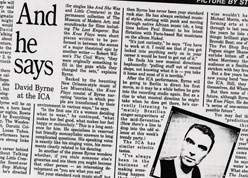ORIGINAL
PRESS CLIPPINGS

DAVID BYRNE'S KNEE PLAYS MAY NOT MAKE SENSE,
BUT IT'S NOT NONSENSE
You put the needle down on David Byrne's new solo album, "Music for the Knee Plays," somehow expecting to hear the smart, blistering funk-rock that characterizes his recent work with the Talking Heads. Or you might expect the high-strung, intense rock and roll of his earlier work.
What you hear is nothing of the sort.
On "Music for the Knee Plays," spare, straightforward horns backed by a minimum of percussion play music seemingly inspired by Dixieland jazz, but with an anxious tension — and usually performed at a dirge-like pace. Periodically, Byrne's cool monotone creeps through with eerie yet oddly funny narration.
"(Talking Heads) is a vehicle for pop songs," Byrne said during a recent interview at Warner Bros. Records offices in Burbank. He speaks in a quiet, almost unemotional voice that covers what is obviously a well of emotions. "So if I'm working on pop songs I think, 'Yeah, that's where that should go.'
"Anything else I'm doing, anything fairly different, I do on my own. This ("Knee Plays") doesn't sound much like the Talking Heads at all," he says, an off-kilter laugh punctuating a point that hardly needs the emphasis.
The Talking Heads already has finished recording a new album, due out this summer, but Byrne's attention is elsewhere at the moment. The avant-garde artist in him wants to discuss "Knee Plays;" he won't talk about the group's new album at all.
The musical sketches collected in "Music for the Knee Plays" are Byrne's contribution to Robert Wilson's epic, confusing and trouble-plagued opera, "The CIVIL warS." Byrne's work was not intended to be pop music in any conventional sense, and it isn't.
Wilson conceived of "Knee Plays" as little entertainment spots between the larger acts of the show, Byrne says. In fact, the name was chosen because the pieces are "joints" between the main action, performed in front of a white scrim on the proscenium while the sets are changed.
The concept was inspired by the entr'actes of vaudeville days, and the music is also reminiscent of that era, in keeping with the historical tone of "The CIVIL warS."
"They seemed very old-fashioned," Byrne says. "I wanted to go against the synthesizers and things like that. I decided to go for something really spiritual in the American sense."
In fact, several of the songs are rearrangements of old Southern spirituals.